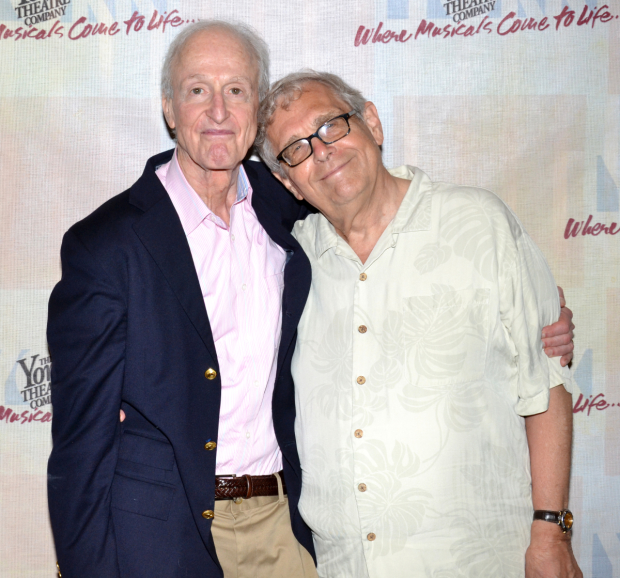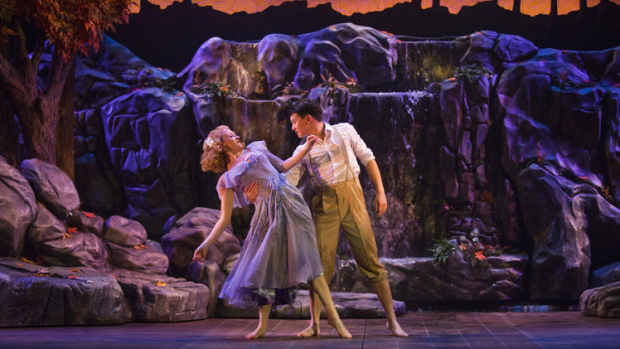As Their Five-Decade Collaboration Continues, Maltby and Shire Chase a Pre-Broadway Waterfall
The writers of ”Big” and ”Closer Than Ever” are currently premiering their latest work at Pasadena Playhouse.
They're two of the musical-theater world's legends. Collaborators since their days as undergrads at Yale in the 1950s, Richard Maltby Jr. and David Shire are the authors of well-regarded, fan-favorite shows like Big and Baby. Shire has an Oscar for the song "It Goes Like It Goes" from the film Norma Rae. Maltby won a 1978 Tony for his direction of Ain't Misbehavin’. Perhaps unbelievably, the only theatrical honor they've ever received is a music-and-lyrics Outer Critics Circle Award for their revue Closer Than Ever.
But that's no matter. More than five decades after they began writing together, Maltby and Shire, now both 77, aren't slowing down. Shire has several productions coming down the pike; Maltby does, too, both as writer and director. Their latest is the Broadway-bound Waterfall, now at Pasadena Playhouse, which explores the illicit romance between a Thai student and the American wife of a Thai diplomat in the years prior to World War II as Siam moves into the vortex of Japan.
Maltby and Shire recently talked with TheaterMania about Waterfall, the case of nerves that comes with every new show, and the writers they admire looking ahead to the future of the genre.

(© David Gordon)
Tell me about the development of this piece and how the two of you came to work on it.
David Shire: It's based on a hit Thai novel, that was made into a hit Thai movie, that was made into a hit Thai musical. The producer-director [Tak Virivan] who owns the theater that developed it decided that he wanted to bring it to Broadway. He teamed up with Jack Daglish, our American producer, and they decided they had to adapt it, so they hired this guy. He dragged me into it. [laughs]
Richard Maltby Jr.: You lose track of [time]. It's hard to define when the work starts. First, there was an "Are you interested?" Then we looked at the film and considered what we would do with it. The original famous Thai novel was all Thai characters. We were looking for a show that could link to an American sensibility. It occurred to me that the story would be really interesting if the woman was American rather than Thai. That meant the entire story had to be rewritten because all of the instincts would be different. It opened itself to the entire political background of an extraordinary period most Americans don't understand very much.
Which was…
Richard: You know Pearl Harbor, but you don't know the ten years before it. In Japan, American culture was taking over the country. Everyone wanted American music, American movies, American clothes, and a whole element of traditional Japan felt really threatened by it. It's entirely possible that that was the genesis of the war. They felt these Western influences would eliminate everything they stood for. That ten-year period is also the time that Thailand [then known as Siam] ended a thousand years of being ruled by kings and became a democracy. The influence of America on Asian history was huge. In many ways, this is a story about America, just as The King and I is ultimately about an American subject, which is slavery.
David, what are your musical influences for the piece?
David: Like any musical that takes place in an exotic locale, you've got to borrow the music, but not too much because you're not doing a musicological thesis. One instrument [used] in particular is that curved xylophone, called the ranat ek. And the pentatonic scale, of course, which is limiting in a way, but it forced me to write music and make discoveries in what you can do with it.
Most of the show takes place in Japan, which we have made clear. To most Americans, Asians are Asians, but they're quite different cultures…the music is different. The Japanese pentatonic scale is what to our ears sounds a little more sinister, which worked perfectly. By the time we started working on the Japanese music, I was running out of things to do with the Thai scales. Ultimately, you have to write good musical-theater music. It did stretch both of us.

(© Jim Cox)
Your leading man, Bie Sukrit, is making his American debut after winning the Thai reality show The Star. How did he come into the project?
David: The show was really written for him. Tak, the director-producer-bringer of American musicals to Thailand…Before he did that, he was like the Simon Cowell of Thailand. He created Bie, who is a real rock star there. You walk down the street with him and the girls go crazy.
Richard: It's a cast of twenty, with one American [Emily Padgett]. The rest are all Asian.
The catalog of musicals you've written is pretty astonishing. After all this time, do you two still get nervous?
Richard: Always. If you're not nervous… if you're not petrified, you're not doing it right. The great thing about musicals is that you're always a beginner. On every show you're a beginner. You think you can bring what you knew to bear on what you're doing, and then you find out that you have to learn it all over again.
What contemporary writers and shows do you admire these days?
Richard: Hamilton is brilliant and so is Fun Home. Those are two works of art.
David: And, of course, Steve [Sondheim] has been a lifelong mentor. How would you describe the negative element of Steve? Richard did a course at NYU and one of the classes…What was it called?
Richard: It was called Dealing with Steve. You go into this business because you want to write like that, and you discover you can't write like that. And you shouldn't write like that. Here is everybody using those chords and those rhythms and those sentence structures — variations on them — and the trouble with Steve is that there's no road you can go down that he doesn't have a big block sitting on right in the road. I wrote that song. I wrote that story. I wrote that scene. The healthy solution is that there is only one thing that Steve Sondheim will never be: He will never be You. You have to find your voice, which is what you ought to do anyway. A few people cross that line, and those people are thrilling. It's one of the essential things you've got to do.

(© Joan Marcus)










